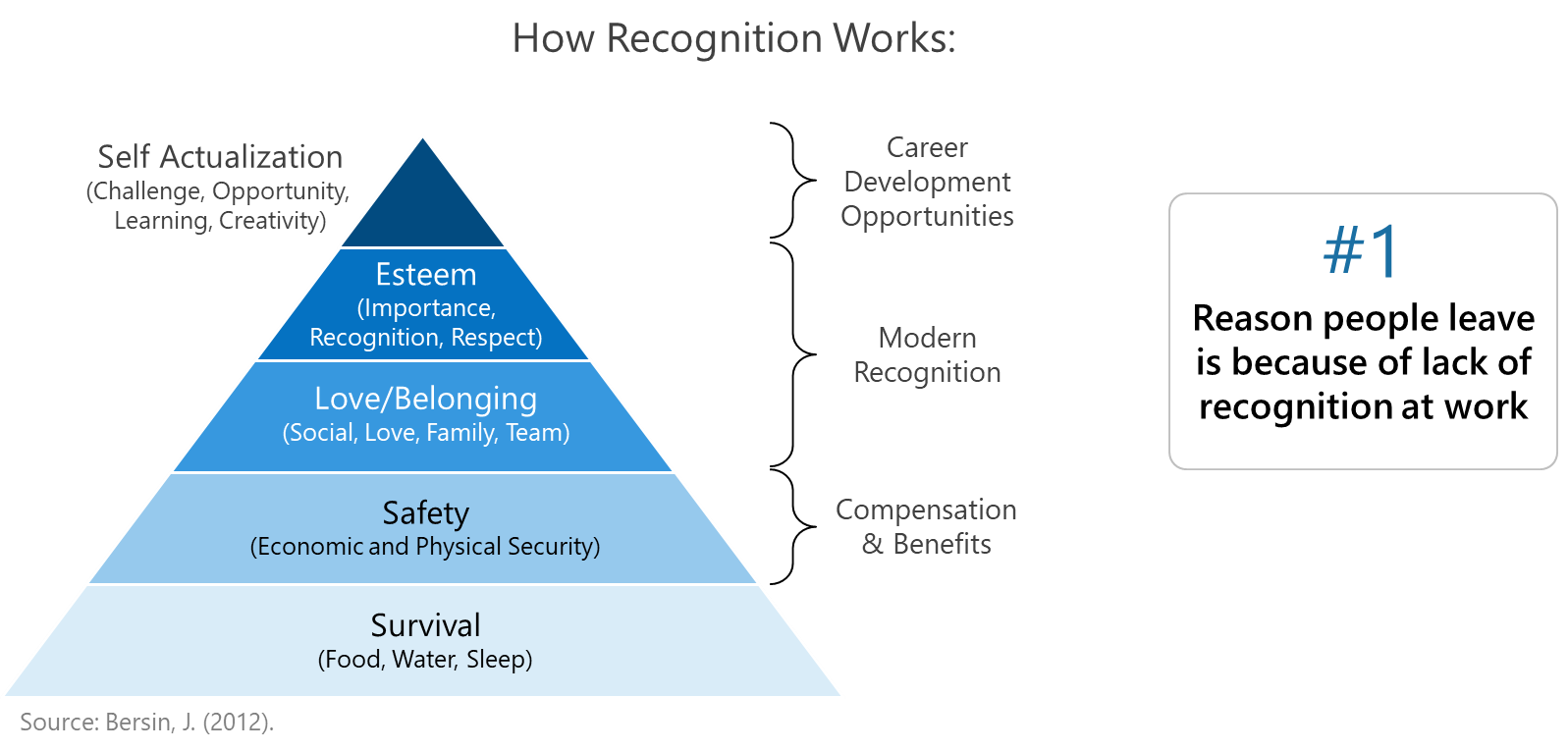
Recognition Changes Behavior
A best practice is to recognize Agent behavior and reward the voice of the customer (VoC) results in a frequent, descriptive, and impactful manner. Agents need to know what they are being recognized for because it motivates them to continue to use the behaviors that helped them achieve customer experience (CX) metrics such as first call resolution, call resolution, customer satisfaction results.
Interestingly, the number one reason Agents leave an organization is due to lack of recognition. In the call center, Agent needs can be met by customers, peers, and management, showing appreciation and recognition for the customer service provided. Agent recognition should not only be carried out by senior management but also by the peers they work with and by the customers they serve.
Maslow’s hierarchy of needs can best describe the psychology of recognition. Josh Bersin (2012) noted that “two of the most valuable psychological needs we have as human beings are the need to be ‘appreciated’ and the need to ‘belong.’” As Bersin stated, and SQM agrees, “compensation and benefits support basic human needs; however, recognition and career advancement support our higher-level psychological needs.”

Motivating Agents to use the desired customer service behaviors to achieve world-class call resolution performance and retaining the best Agents are great challenges. An effective recognition program greatly helps motivate Agents to excel at providing call resolution at the world class level and for the organization to retain the top call resolution performing Agents.
It is important to note that 46% of customers whose call was not resolved felt the Agent could have done more to resolve their call. In many of those cases, the Agents were not motivated to use the desired customer service behaviors to resolve customer calls. In other words, from a customer point of view, it was a will issue rather than a skill issue.
As mentioned, recognition needs to be provided in a frequent, descriptive, and impactful manner so that Agents know why they are being recognized. In turn, Agents are motivated to continue using the behaviors that helped them achieve results.
SQM clients that are performing at the world class First Contact Resolution (FCR) level use the following recognition best practices, or a variation thereof, for recognizing Agents:
Recognize Agents daily, weekly, monthly, quarterly and annually. The more timely, consistent and frequent, the better.
Recognize Agents for specific behaviors that they used to resolve a call or provide great customer experience. The more descriptive the feedback is, the more the Agent will feel it is sincere.
Focus Agent recognition on behaviors that have a positive impact on FCR, Csat and call resolution performance. These are the behaviors you want the Agent to repeat.
Know that each Agent is motivated by recognition differently. Do they prefer private, or public recognition? Are they motivated by money, time off, or recognition by leadership?
A best practice for recognition investment is to spend 1% of a Agent’s annual pay, or about $400 per Agent, per year.
Types of Agent Recognition Programs:
Agent recognition programs have saturated the call center industry, making it difficult to know which one will help improve a customers’ experience when contacting your organization. Listed below are four VoC recognition programs that have proven successful in motivating Agents to improve CX.
Call Kudos Recognition:
All employees use this program within a call center to recognize each other for something that a subordinate, peer, or supervisor felt was worthy of their recognition. Kudos focuses on recognition. While rewards and points can be used, emphasizing recognition motivates Agents to improve CX or maintain great CX. For example, this program can be a great way for customer service Agents to recognize escalation Agents and supervisors that assisted them in resolving a call. Also, it can be used by a supervisor to recognize Agents who did a great job resolving a call or their call resolution and customer satisfaction is improving or is at a world-class performance level.
Santa in a Box:
All employees get the same gift, whether an Agent or an SVP. A call center social committee determines the Christmas gifts. The gifts are kept in complete secrecy until the employee opens them up. Employees really like the Santa in a Box Recognition Program because it is a tradition; it happens every year. A VP or SVP can give the Santa in a Box gift to an Agent and at the same time recognize the Agent for their CX performance (e.g., individual call or overall performance). Agents are wowed by having a senior manager give them the gift and the personalized CX recognition.
Service Hero Recognition:
Regence BlueCross BlueShield’s Agent recognition program is called Service Hero. Their Service Hero recognition program is their most successful and longest-running recognition program. It recognizes the Agents who provide exemplary service and provides senior executives with great insights into customer experiences trying to resolve complex calls. Any call can be nominated to be a winning Service Hero interaction. Often calls are nominated by a leader as they listen to calls and identify situations where the Agent is truly going above and beyond.
Voice of Customer Certification Recognition:
Of all the recognition practices used for Agents and supervisors, the one that has been the most effective at helping call centers improve or maintain their FCR and Csat performance is a CX certification program based on the voice of the customer. Certified Agents are eligible to be nominated as one of the Top 25 finalists for the Agent of the Year award.
Quick Related Links
First Call Resolution Definition First Call Resolution PPT First Call Resolution Benefits
First Call Resolution Strategies First Call Resolution Operating Philosophy Survey Data Calculate First Call Resolution Rate What is a Good FCR Rate? VoC Closed-Loop Top 10 CX Metrics Agent Coaching and Recognition
